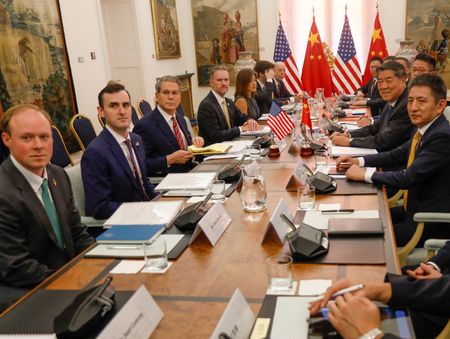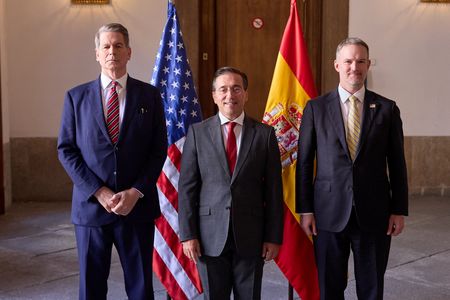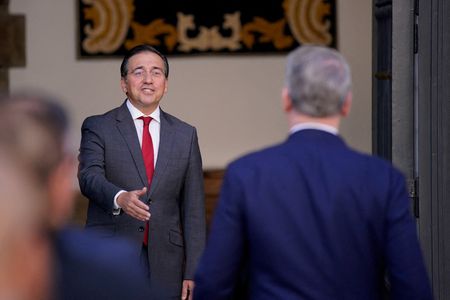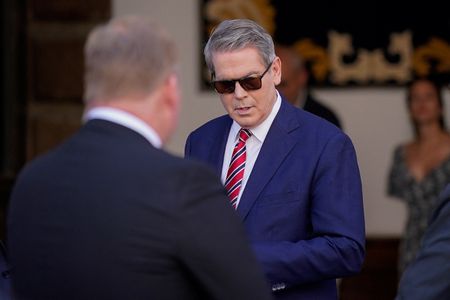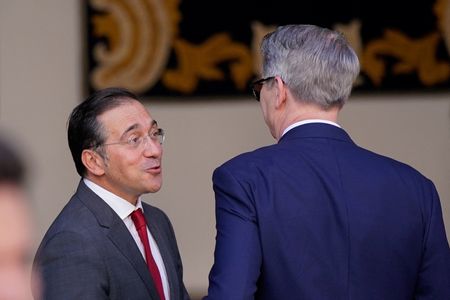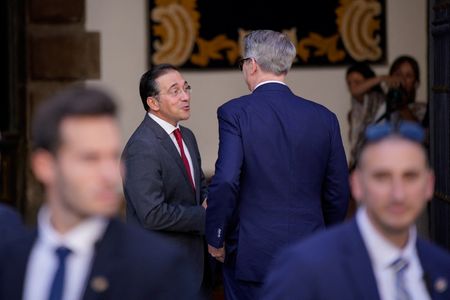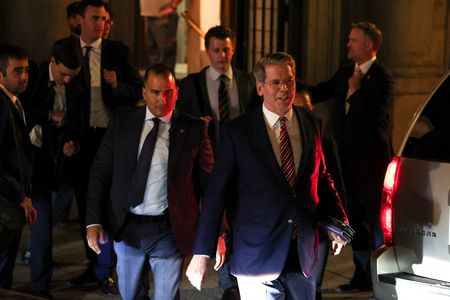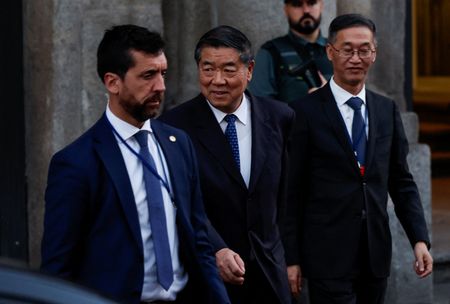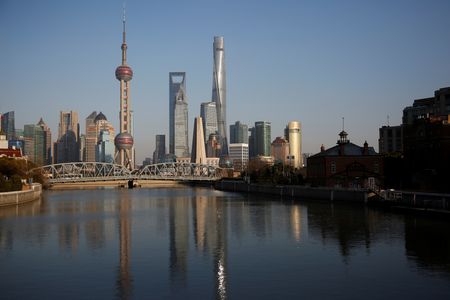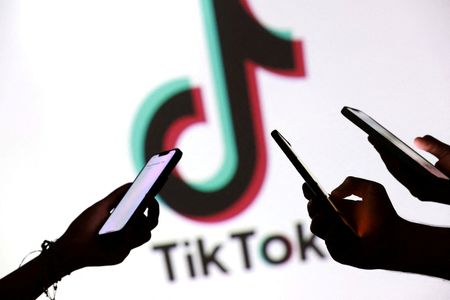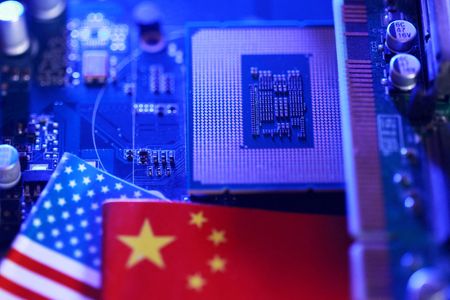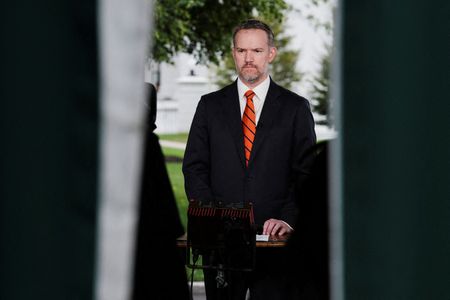By David Lawder
MADRID (Reuters) – U.S. and Chinese officials concluded a first day of talks in Madrid on Sunday on their strained trade ties, a looming divestiture deadline for Chinese short-video app TikTok, amid Washington’s demands that its allies place tariffs on imports from China over its purchases of Russian oil.
U.S. Treasury Secretary Scott Bessent told reporters as he left the central government palace: “We’ll start again in the morning.”
Talks between delegations led by Bessent and U.S. Trade Representative Jamieson Greer with Chinese Vice Premier He Lifeng and China’s top trade negotiator, Li Chenggang, at the baroque Palacio de Santa Cruz, which houses Spain’s foreign ministry ended after about six hours.
They mark the fourth time in four months that the delegations have met in European cities to try to keep a fractured U.S.-China trade relationship from collapsing under President Donald Trump’s tariffs.
They last met in Stockholm in July where they agreed in principle to extend for 90 days a trade truce that sharply reduced triple-digit retaliatory tariffs on both sides and restarted the flow of rare-earth minerals from China to the United States.
Trump has approved the extension of current U.S. tariff rates on Chinese goods, totaling about 55%, until November 10.
TIKTOK DEADLINE EXTENSION LIKELY
Trade experts said there was little likelihood of a substantial breakthrough in the talks hosted by Spain.
The most likely result of the Madrid talks is seen as another extension of a deadline for the popular TikTok app’s Chinese owner, ByteDance, to divest its U.S. operations by September 17 or face a U.S. shutdown.
A source familiar with the Trump administration’s discussions on TikTok’s future said the deadline would be extended for a fourth time since Trump took office in January.
TikTok has not been discussed in previous rounds of U.S.-China trade talks in Geneva, London or Stockholm. But the source said the issue’s public inclusion as an agenda item on the Treasury’s announcement of the talks gives the Trump administration political cover for another extension.
“I’m not expecting anything substantive between the U.S. and China unless and until there is a one-on-one meeting between Trump and (Chinese President Xi Jinping). Setting that up is really what these talks are all about,” said William Reinsch, a senior fellow and trade expert at the Center for Strategic and International Studies, a Washington think tank.
Trump has repeatedly expressed interest in such a meeting, but Reinsch said that the Chinese would not agree to one until they know the outcome, and are pushing for further easing of U.S. export controls on chips and other high-tech goods.
“This meeting is an opportunity to measure each other’s positions and to learn more about each side’s red lines,” Reinsch said.
Wendy Cutler, a former USTR trade negotiator and head of the Asia Society Policy Institute in Washington, said she too expected more substantial “deliverables” to be saved for a potential Trump Xi meeting later this year, perhaps at an Asia-Pacific Economic Cooperation summit in Seoul at the end of October.
These may include a final resolution on TikTok, and a lifting of restrictions on Chinese purchases of American soybeans and reduction of fentanyl-related tariffs on Chinese goods, she added.
“Frankly, I don’t think China is in any rush to do an agreement where they don’t get substantial concessions on export controls and lower tariffs, which are their key priorities,” she said. “And I don’t see the United States in a position to make major concessions on either, unless there’s some breakthrough on its demands to China.”
RUSSIAN OIL PRESSURE
The Treasury has said the Madrid talks also would cover joint U.S.-Chinese efforts to combat money laundering, a reference to its longstanding demands that China clamp down on illicit shipments of technology goods to Russia that aid its war in Ukraine.
Bessent urged Group of Seven allies on Friday to impose “meaningful tariffs” on imports from China and India to pressure them to stop buying Russian oil, a move aimed at bringing Moscow into Ukraine peace negotiations by curbing its oil revenues.
The G7 finance ministers said on Friday they discussed such measures and agreed to speed up discussions to use frozen Russian assets to aid Ukraine’s defense.
Bessent and Greer said in a separate statement that G7 allies should join the United States in imposing tariffs on imports from countries that buy Russian oil.
The U.S. has imposed an extra 25% tariff on Indian goods over the country’s purchases of Russian oil, but has so far refrained from imposing such punitive duties on Chinese goods.
China’s Ministry of Commerce has said the Madrid talks will cover economic and trade issues such as U.S. tariffs, the “abuse” of export controls and TikTok.
The talks are due to resume between 8 and 10 a.m. local time (0600 to 0800 GMT) on Monday with tentative post-talks press conferences scheduled by the parties in the afternoon.
(Reporting by David Lawder in Madrid, additional reporting by Corina Rodriguez Pons and Pietro Lombardi in Madrid and David Shepardson in Washington; writing by Charlie Devereux and Aislinn Laing; Editing by Matthew Lewis, Philippa Fletcher and Lisa Shumaker)

